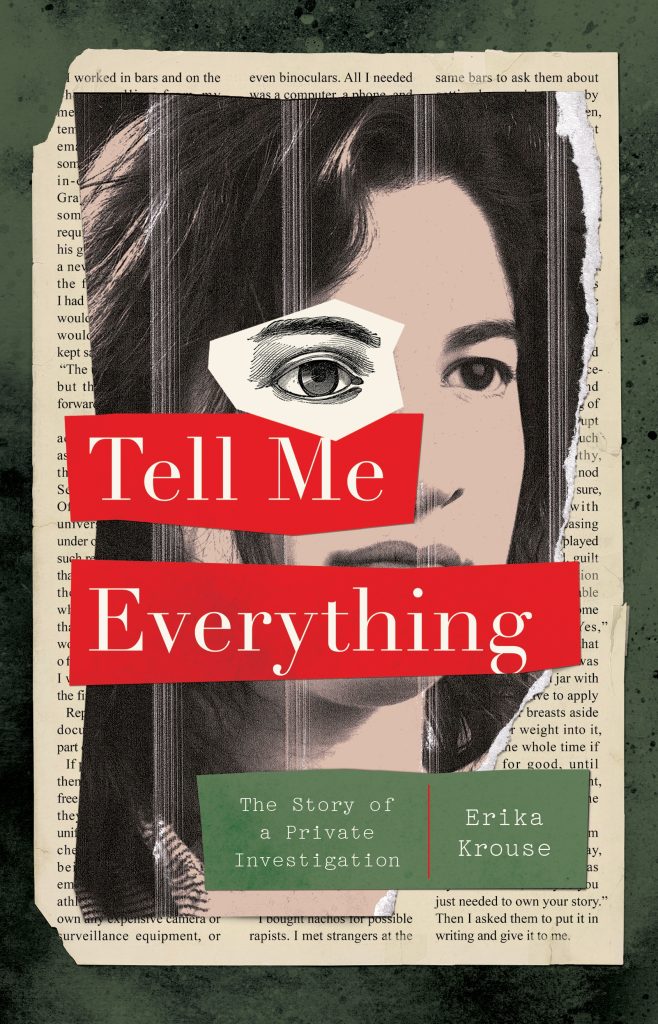
Denver author Erika Krouse recently won the 2023 Colorado Book Award for creative non-fiction with her memoir Tell Me Everything, an account of her time as a private investigator working a sexual assault case involving football players at an unnamed Colorado university. But it doesn’t take much in the way of detective skills to figure out that she’s writing about an institution in our own backyard: CU-Boulder.
For legal reasons, she never specifically says it in the book, but the case Krouse worked on was the 2007 Title IX lawsuit filed after allegations of rape at a party attended by CU football players in 2001. In that case, the university reached a settlement with one woman for $2.5 million and another for $350,000.
Taken separately, the elements of the book have all the makings for a sensationalized account — sexual violence, systemic abuse, athletes living above the law, and the slow-grinding wheels of the justice system. But this isn’t that kind of book. It’s bigger than that.

That’s largely due to Krouse’s ability as a writer. She’s published fiction in The New Yorker and works as a creative writing professor at Regis University and Lighthouse Writers Workshop in Denver. She expertly weaves the disturbing material of the P.I. case with the story of her own personal battles to create a compelling narrative that’s more than just an accounting of terrible abuses. Krouse worked hard to not only avoid exaggerating the facts, but to protect the identities of the very real people she depicts.
“That’s the thing that kept me up at night,” she says. “I was scared of hurting people. I would either have insomnia or wake up in the middle of the night and say, ‘Oh my god, I forgot to change the state that person is from.’ These are people I worked to protect. And they really wanted to tell us their stories. It’s important to protect them.”
One of the more impressive accomplishments in Krouse’s tale is the way she builds a cohesive, dramatic arc out of both stories — the case and her personal life — that comes together with a satisfying climax and resolution.
“I don’t have a lot of periods of time in my life that really fit that kind of narrative arc, but this one just did,” she says. “There were places where, if it had been a novel, I would have been able to change what happened [and] move things around. But you can’t do that with nonfiction.”
This was Krouse’s first attempt at a memoir, and she ended up having to reckon with the advice she gave her students. She used to tell them that writing a memoir and fiction are the same: You’re telling a good story. And that may be true to a point, but she also learned that the two modes are very different.
For one, Krouse had to be painstakingly careful about the facts. If she screwed up one detail, she not only risked losing the reader’s faith in the story, but in the case itself.
“There are a lot of high stakes with regard to accuracy and journalism, and I’m not a trained journalist,” Krouse says. “It was an on-the-job training kind of situation.”
Then there’s the personal angle. Krouse unflinchingly delves into her relationships, including with her partner, her mother and her boss. There’s also an unnamed abuser from her childhood that reappears throughout the story as she tries to convince family members of the trauma she suffered. This didn’t come easy. Krouse wasn’t used to mining her personal history for material.
“That was a strange thing for me,” she says. “I’m actually a pretty private person. That was a leap of faith I had to make toward the reader [so] they would be compassionate to me, too. It took a lot of long nights and I’d say a fair amount of alcohol to get through that.”
‘People want to be seen’
Publication of Tell Me Everything was shut down for seven months because of what Krouse calls “legal bullying.” She says that taught her the importance of finding a pro bono lawyer to help back her up. Krouse declined to comment further on why the book was stalled, citing legal reasons.
Early in the book, Krouse writes about how she has a face that makes people want to tell her things. That quality helped her as a private investigator in this case, but the author also credits her success in the field to an awareness that people simply want someone to care about their lives.
“Most people want to be seen,” she says. “Most people want to be known for who they are, even if it’s scary. That’s why a lot of extremely brave women came forward and talked about what happened to them, even at greater cost to themselves.”
After the 2007 Title IX case ended, a string of similar allegations began to surface at universities across the country. Krouse says more sunlight on a “rampantly abusive” system has expanded the frame for thinking about such cases altogether.
“It began not just a new way of looking at law, but also a way of looking at sexual abuse,” she says. “[It’s] not just a criminal problem, but also a systemic problem and a civil rights issue.”
Today, Krouse has largely set aside private investigation work. She might do a favor for a friend with a stalker as a one-off, for example, but she’s mainly focused on writing and teaching. Her next book, a collection of short stories, is due sometime next year.
“That’s not to say I wouldn’t take a case if it were amazing,” she says. “If it were something I could really sink my teeth into. I haven’t had any cases like that in a while. But if one of those dropped in my lap, I would do it.”
ON THE PAGE: Tell Me Everything: The Story of a Private Investigation by Erika Krouse. Available now via Flatiron Books.
BONUS: Five nonfiction book recommendations by Erika Krouse
- West with the Night by Beryl Markham. “In 1936, Beryl Markham was the first pilot to fly solo across the Atlantic nonstop, and her writing was similarly gravity-defying (Ernest Hemingway agreed). This may be my favorite memoir.”
- Notes on a Silencing by Lacy Crawford. “Speaking up often comes at a cost; Crawford pays that price for all of us, inspiring us to break our own silences and do the same. This memoir is one of the most courageous books I’ve ever read.”
- Girlhood by Melissa Febos. “This essay collection reached a primal, visceral place in me, and shook me up as a feminist writer (in a good way). The writing is spectacular.”
- Loitering by Charles D’Ambrosio. “I sometimes like to mark favorite sentences with sticky notes as I read. I used up three books of sticky notes on this masterful essay collection; my copy is a happy but deformed mass of paper and glue.”
- Blue Highways: A Journey into America by William Least Heat Moon. “In my early 20s, this memoir inspired me to take my own long journey to discover America along the back roads. I decided to become a writer on that odyssey, partly because of this book.”














